Last summer we had mouse infestation under the wooden decking to the rear of our house. They were burrowing under the decking, into our sheds, chewing through boxes, and generally being a nuisance.
As a cat owner, I thought that my cat would keep mice away. After all, she’s a Ragdoll and they are meant to be ratters. However, either my cat is no good at scaring mice away, or they just didn’t care.
But that won’t always be the case. Whether a cat can keep mice away will often be breed dependent and depend on where the mice are. Here’s the short answer, followed by the details.
Will a cat keep mice away? Cats can scare away mice, but it’s not foolproof or guaranteed. There are some breeds which will try to catch and keep mice under control and the numbers lower. However, the mere presence of a cat, is not enough to keep mice away.
There are lots of cats who will chase mice due to their breeds. Certain breeds are territorial and will try to kill mice, which could keep them out of your house.
Will a cat scare away mice?
Back to the original question, and with things like this I prefer to lean on what science has to say. Whilst some cats will chase and attack mice which might keep them out of your house, it won’t stop them on your property completely.
In 2017, research was published by a team from the University of Florida. They conducted tests to see whether mice populations reduced in the presence of dogs and cats. Here’s what they discovered:
“The presence of dogs and cats at the same homestead significantly reduced activity of pest rodent species. However, if only cats or dogs alone were present at the homestead there was no observed difference in rodent foraging activity in comparison to homesteads with no cats or dogs.” (view source)
What that means is that, if there is a cat and dog together, mice can be scared away. However, if it’s just one of the pets, e.g., just a cat, mice will not reduce in numbers.
Are mice scared of cats?
That doesn’t mean mice aren’t scared of cats. When a mouse senses a cat in the house, they will make themselves scarce. However, the mice tend to venture back out as soon as the cat has moved to another part of the house.
This is due to a couple of different reasons. First, mice are attracted to the scent of cat food. The other reason is that mice might eat a cat’s feces if there is no other food available for them.
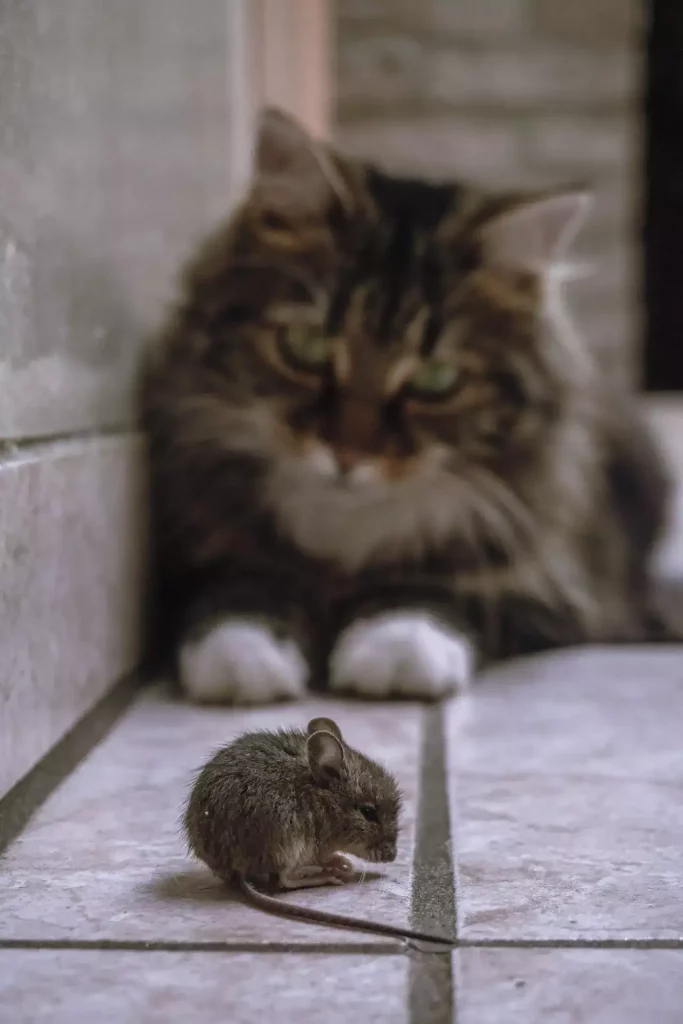
This is a reason why you should always address housebreaking issues with cats right away, and also clean up feces from the yard as soon as possible.
Since mice will possibly return, if your cat has alerted you to the fact that there are mice in the house, it is time for you to take preventative action.
The bottom line is a cat is not going to keep mice away for good. Chasing a mouse out of the house is a temporary measure, and only puts a sticking plaster over your rodent problem.
Which cat breeds can keep mice away?
Historically, certain cats were bred with the purpose of pest and rodent control. This would often happen on farms, as it was essential to keep mice away from crops and livestock.
This was common during the era of the Black Death. The plague was carried by fleas that resided on rats, and so cats were put to work as pest hunters. Smaller cats are better at hunting this type of prey, as they can chase them into tight areas.
Here’s the list of cats that can scare mice away:
- Siamese.
- Maine Coon.
- Siberian.
- American Shorthair.
- Manx.
- 6. Japanese Bobtail.
- Chartreux.
- Persian.
Siamese and Maine Coon breeds are among the most common mice and rat hunters. These cats are small in stature and have high-energy personalities.
They are quick to bolt after a pest and chase it into a small space or down a hole. They maintain their ancestorial instinct of chasing after rats and mice and hissing furiously when they find one.
Manx cats were also bred to hunt small prey. They are very active and curious, so they will always investigate scratching noises in the walls. They also love to dig, so they will help rid your garden of gophers and voles.
Persians are also good at hunting mice. These cats will be obsessive about getting to a mouse in the house as soon as they detect one. Papillons have very large ears, so they can hear quiet squeaking noises.
If you notice your Persian unexplainably wanting to get behind, inside, or underneath a large piece of furniture, there is a good chance that it contains a mouse nest.
There are also a few myths about cats keeping mice away…
Will cats’ fur keep mice away?
I don’t know where this came from, but there is no proof to it. Cat hair does not keep mice away, and neither does cat urine keep mice away.
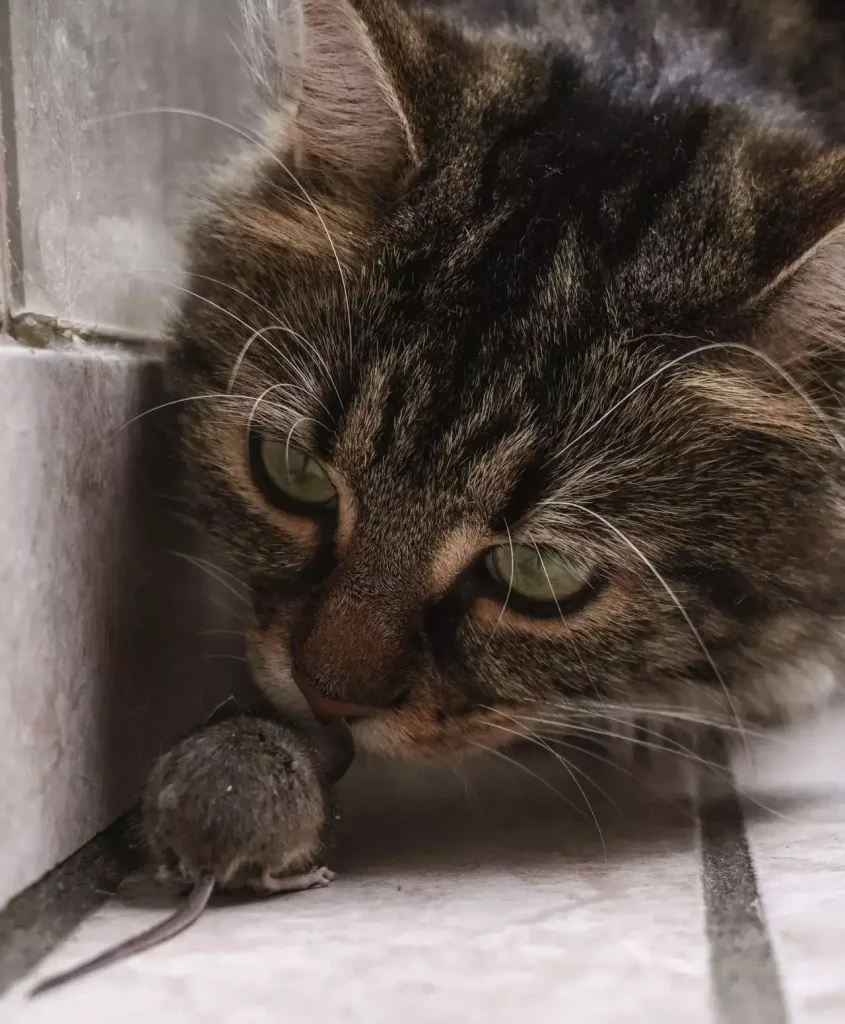
I’ve heard similar rumours about cats hair scaring foxes away too – and yes, that doesn’t work either, I tested it.
Will the smell of a cat keep mice away?
Similarly, there’s no proof or studies I can find to suggest that mice will leave if they smell a cat. The only thing guaranteed to make a mouse leave is if they see and hear the cat coming towards them – that’s when they will run.
For what it’s worth, the smell of a cat won’t even keep mice away. We used to live in a farming village and had a cat, and the mice would still come in the house all the time.
Training your cat to hunt mice
If you really want to get hold of the mouse problem, perhaps you might be able to train your cats to hunt and chase mice out of the house.
As you realise though, some cats are better at hunting small prey than others. You can tell that a cat might be good at catching mice if they display some or all of the following body language:
- Perked up ears.
- Sniffing inside at furniture or walls.
- Listening for noises in a seemingly silent house.
- Tilting of the head.
- General alertness when there is no known stimulus around.
These are all signs that it might be worth the effort to train your cat to become a mouse hunter.
The first step to training your cat to catch mice is familiarizing them with the scent. This can be done if you have caught a live mouse in a trap or borrowed a pet mouse.
Put the cat and trapped mouse in a room together but do not let the cat go close to it. The point of this is to let the cat familiarize themselves with the smell from a distance.
After this, let your cat get close to the cage. Once they start showing interest in getting in the cage, calmly praise them. When they paw at the cage, give them pets and treats.
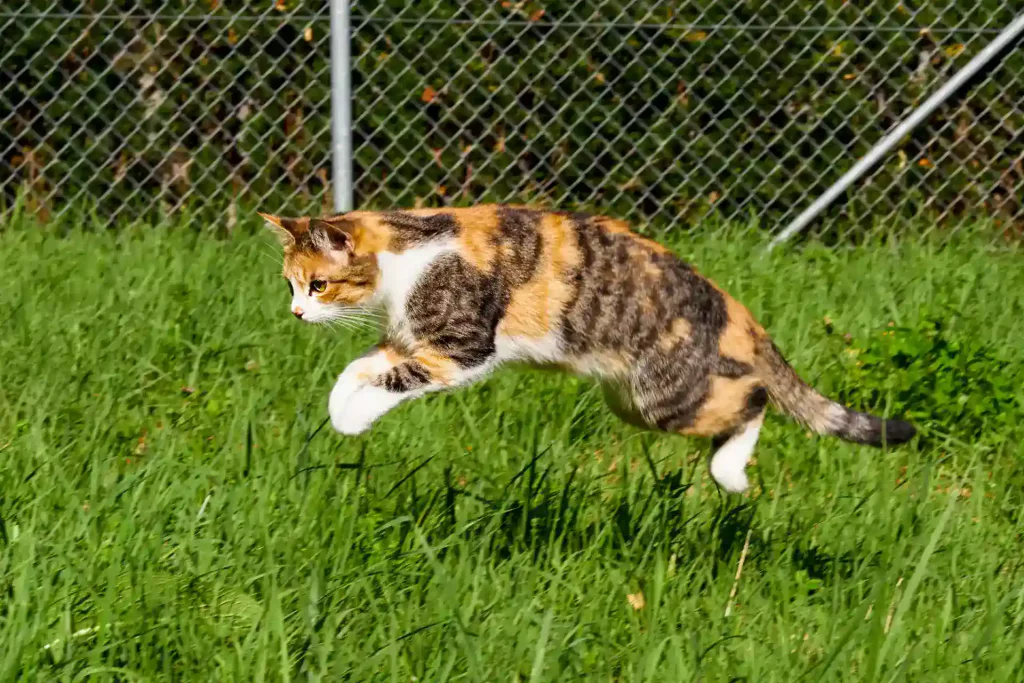
If possible, transport the mouse into a hamster ball (do not ever handle the mouse with your bare hands). Then place the hamster ball outside in the yard. Let your cat out into the yard and chase the mouse around.
If it is a pet mouse, of course, do not let your cat harm them. Reward your cat with treats and give him lots of praise when he has captured the mouse.
Your cat should have the general idea that catching mice will please you and result in treats. Hopefully, he will be equipped to handle real-life mice situations inside the house.
My cat ate a mouse, now what?
Cats are more likely to kill and play with a mouse than they are to eat them.
However, consumption does occasionally happen, and that will need to be addressed. Normally, a cat eating a mouse would be no cause of concern at all, but it depends on if the mouse was poisoned at the time – some people will also worry about rabies (here’s why).
Assuming the cat found a dead mouse and ate it, this is very concerning. The mouse likely died due to pest poison, which is now in your cat’s body as well. You will need to bring your cat to the vet so that they can induce vomiting or even surgery if necessary.
Handy Hint: Here’s more detail on what to do if your cat happened to eat a dead and poisoned mouse.
If the cat killed the mouse and then ate it, this is less of a concern, but they will still need to undergo an evaluation at the vet.
If it was a kitten that ate a mouse, this is a different scenario as well. Kittens are not fully-grown, and therefore will have difficulty with digesting the mouse. You will need to alert your vet right away, as the kitten may form an obstruction in their bowel.
How to keep mice away if your cat doesn’t’ quite cut it
Having a cat that can catch mice is great, but the best scenario would involve having a mouse-free house in the first place. The following is a list of methods that you can try to prevent or reduce mice in the house:
- Keep all pet food in a sealed, mouse-proof container. Do not leave any excess pet food in the bowl, as this is an easy source of food for mice. Glass containers are best, as mice can chew through plastic ones.
- Similarly, seal all human food as well. This includes things such as cereal, rice, and oatmeal, all of which are beloved by mice.
- Do not keep any standing water in the yard, as this is giving the mice free access. If you keep a bowl of water for cats outside, empty it and clean it every night.
- Clean all spilled food immediately. Do not leave any food out overnight.
- Repair all the holes and cracks that are leading into your house. These are providing the mice with a direct path into the home.
- If a door is often left open, consider installing a self-closing device. This will prevent the chance of a mouse sneaking inside unnoticed.
Conclusion
Whenever my friends try to convince me to get a cat, they always mention “and they keep the mice away!” I would always nod and smile, but one day I had my rebuttal ready – “well so can my cat!”…
But as you will now know, my cat didn’t quite manage it! Just like she loves to chase squirrels, she never catches them, the same with the mice.
I agree that certain breeds of cats will be better at hunting mice, but the pests will be scared by any cat in general. However, after mice run away, they do tend to return to houses that are inhabited by cats.
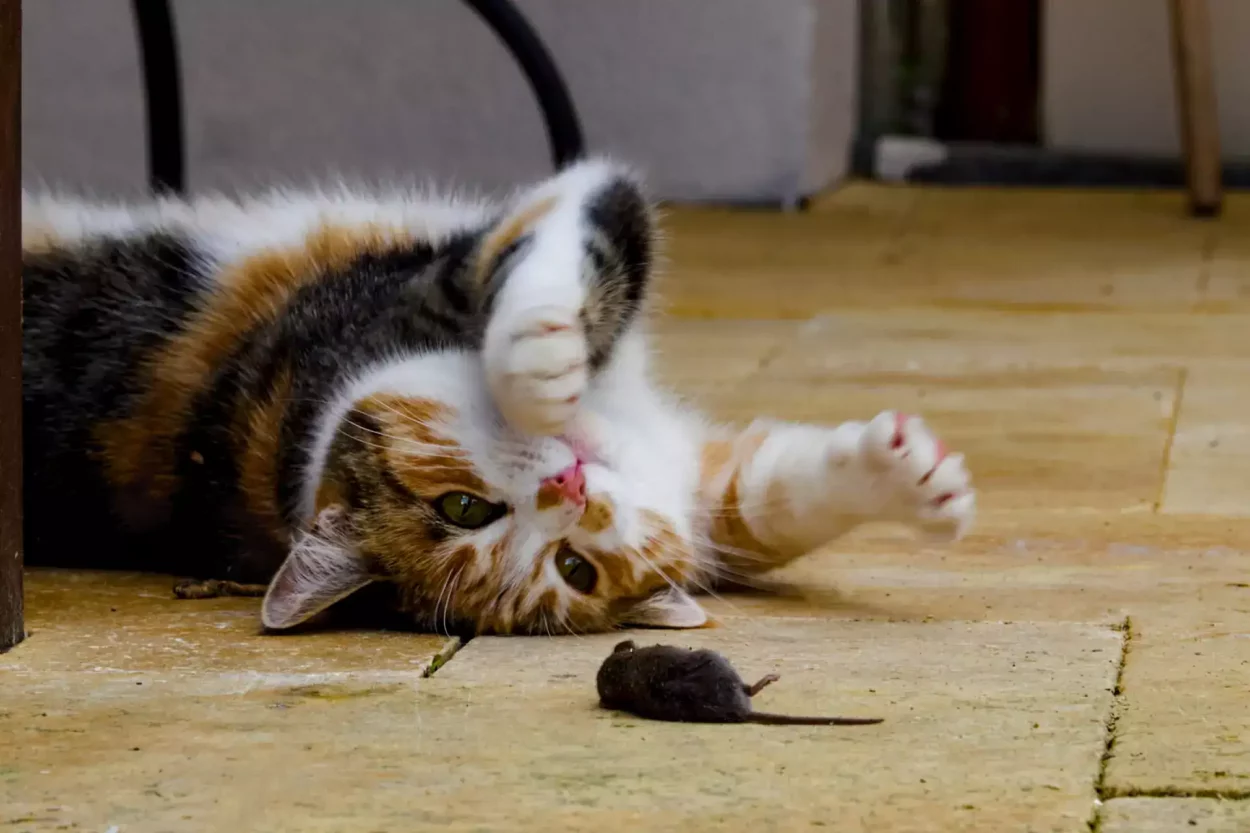
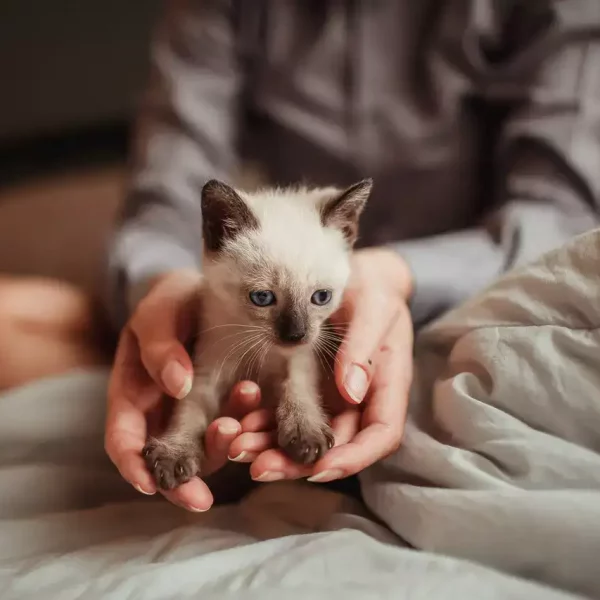
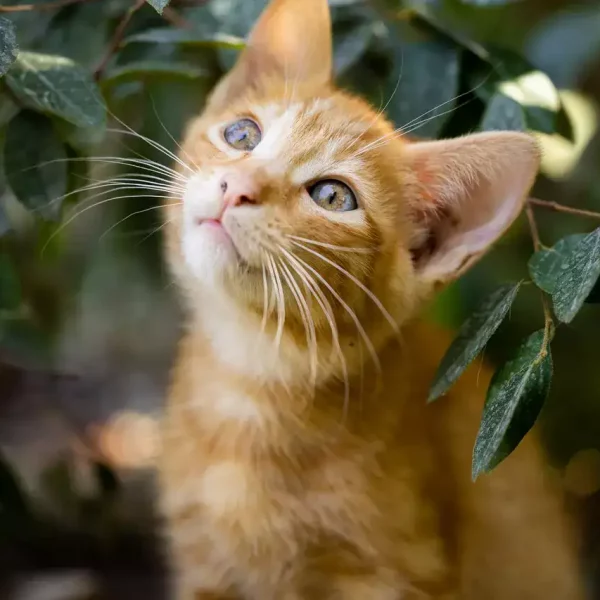
Leave a Comment